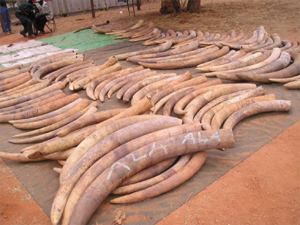Ivory poaching sounded death knell for 60 percent of forest elephants in Africa in last decade
 Cape Town, Mar 5 : African forest elephants are being poached out of existence. A study published in the online journal PLOS ONE showed that across their range in central Africa, a staggering 62 percent of all forest elephants have been killed for their ivory over the past decade. "The analysis confirms what conservationists have feared: the rapid trend towards extinction - potentially within the next decade - of the forest elephant," Dr. Samantha Strindberg of the Wildlife Conservation Society (WCS), one of the lead authors of the study, said. "Saving the species requires a coordinated global effort in the countries where elephants occur - all along the ivory smuggling routes, and at the final destination in the Far East. We don''t have much time before elephants are gone," the other lead author Dr. Fiona Maisels also of WCS said.
Cape Town, Mar 5 : African forest elephants are being poached out of existence. A study published in the online journal PLOS ONE showed that across their range in central Africa, a staggering 62 percent of all forest elephants have been killed for their ivory over the past decade. "The analysis confirms what conservationists have feared: the rapid trend towards extinction - potentially within the next decade - of the forest elephant," Dr. Samantha Strindberg of the Wildlife Conservation Society (WCS), one of the lead authors of the study, said. "Saving the species requires a coordinated global effort in the countries where elephants occur - all along the ivory smuggling routes, and at the final destination in the Far East. We don''t have much time before elephants are gone," the other lead author Dr. Fiona Maisels also of WCS said.
The study, which examines the largest ever amount of Central African elephant survey data, comes as 178 countries gather in Bangkok to discuss wildlife trade issues, including poaching and ivory smuggling. The study, the largest ever conducted on the African forest elephant, includes the work of more than 60 scientists between 2002 and 2011, and an immense effort by national conservation staff who spent 91,600 person-days surveying for elephants in five countries (Cameroon, Central African Republic, the Democratic Republic of Congo, Gabon and the Republic of Congo), walking over 13,000 kilometers (more than 8,000 miles) and recording over 11,000 samples for the analysis.
The paper shows that almost a third of the land where African forest elephants were able to live 10 years ago has become too dangerous for them. "Historically, elephants ranged right across the forests of this vast region of over
2 million square kilometers (over 772,000 square miles), but now cower in just a quarter of that area," Co-author Dr. John Hart of the Lukuru Foundation said. Although the forest cover remains, it is empty of elephants, demonstrating that this is not a habitat degradation issue.
This is almost entirely due to poaching." Recent surveys from Democratic Republic of Congo showed a major decline of elephants in the Okapi Faunal Reserve, considered the last stronghold for elephants in the region. Results show clearly that forest elephants were increasingly uncommon in places with high human density, high infrastructure density such as roads, high hunting intensity, and poor governance as indicated by levels of corruption and absence of law enforcement.
Distinct from the African savannah elephant, the African forest elephant is slightly smaller than its better known relative and is considered by many to be a separate species. They play a vital role in maintaining the biodiversity of one of the Earth''s critical carbon sequestering tropical forests. Research carried out by the CITES-MIKE programme has shown that the increase in poaching levels across Africa since 2006 is strongly correlated with trends in consumer demand in the Far East, and that poaching levels are also strongly linked with governance at the national level and poverty at the local scale.
This has resulted in escalating elephant massacres in areas previously thought to be safe. Earlier this month, the government of Gabon announced the loss of approximately 11,000 forest elephants in Minkébé National Park between 2004 and 2012; previously holding Africa''s largest forest elephant population. "Gabon''s elephants are under siege because of an illegal international market that has driven ivory prices in the region up significantly.
I call upon the international community to join us in this fight. If we do not reverse the tide fast the African elephant will be exterminated," President Ali Bongo Ondimba of Gabon said. Effective, rapid, multi-level action is imperative to save elephants. A drastic increase of funding, and an immediate focus on the most effective protection strategies, are essential to avoid future huge losses to the remaining elephant populations. (ANI)